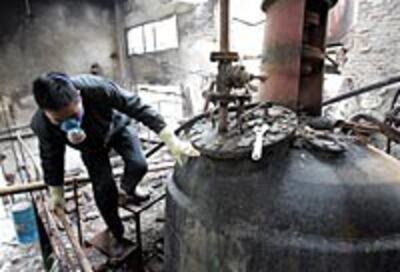
China’s decision to impose longer prison sentences for pollution accidents has drawn mixed reviews from environmental experts. Some fear that punishment could be a substitute for costly plant cleanups and accident prevention.
On July 28, China’s Supreme People’s Court issued a new legal interpretation “in order to make it easier to convict polluters and officials responsible for environmental crises,” China’s official Xinhua news agency reported.
Under the decision, polluters and negligent officials can be imprisoned for up to three years for “environmental hazards that cause even a single death,” the report said. Prison terms can range up to seven years if three people are killed or if ten people are seriously injured or over thirty people receive less serious injuries.
Before the Court’s decision, penalties had usually been less than three years for convictions in major pollution cases.
A useful tool?
A lot of the time, people in charge of the factories could be officials themselves. I think this has the potential to be a really big loss of face because it really publicizes what happens,
In an interview with Radio Free Asia, Jennifer Turner—coordinator of the China Environment Forum at the Washington-based Woodrow Wilson International Center for Scholars—said that tougher sentences may be a useful tool for environmental enforcement.
“[China’s] State Environmental Protection Administration (SEPA) is pretty weak in China,” Turner said. “Compared to other ministries, they really have not had the kind of power necessary to enforce the regulations.”
Turner said that SEPA’s local environmental protection bureaus have been virtually powerless to enforce regulations until now because their salaries are paid by local governments. And those same governments may have interests in plants that pollute, Turner added.
“A lot of the time, people in charge of the factories could be officials themselves. I think this has the potential to be a really big loss of face because it really publicizes what happens.”
But Turner said that threats to punish officials do not address the question of how pollution can be controlled. Prison terms for a few officials may not bring results if plants continue to dump waste into rivers or expose the public to environmental risks.
“What is going to happen in the factories?” Turner asked. “Will the court have the power to impose other penalties on the factories, to demand not only compensation for people who might have been injured, but actual changes?”
Tougher sentences ‘not enough’
Elizabeth Economy, an expert on China’s environment and director for Asia studies at the Council on Foreign Relations in New York, said that China’s justice system is largely untested in matters of environmental law.
“For example, in the legal system, it’s not enough to simply set tougher sentences. You also need to have lawyers and judges who are trained to understand and to properly interpret China’s environmental laws and regulations.”
In what she called a “setback for environmental enforcement,” Economy also noted that China’s government has threatened the press with fines of 10,000 yuan for unauthorized reporting of accidents.
“We need greater transparency and greater openness in this area,” she said.
Sound environmental practices, better plant safety, and solutions to problems of waste disposal require urgent attention, Economy said. “Simply putting tougher sentences into force is not going to be the answer to the range of problems that China faces.”
Original reporting by Michael Lelyveld. Edited for the Web by Richard Finney.
